Examsrevision
On this page, you find all documents, package deals, and flashcards offered by seller ExamsRevision.
- 1077
- 0
- 127
Community
- Followers
- Following
22 Reviews received
1204 items
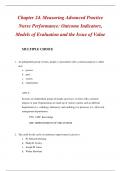
Chapter 24. Measuring Advanced Practice Nurse Performance: Outcome Indicators, Models of Evaluation and the Issue of Value
MULTIPLE CHOICE 1. An independent group of items, people, or procedures with a common purpose is called a(n): a. process. b. goal. c. system. d. organization. ANS: C Systems are independent groups of people, processes, or items with a common purpose or goal. Organizations are made up of various systems such as different departments (i.e., radiology, laboratory, and cardiology) or processes (i.e., QI or risk management departments). PTS: 1 DIF: Knowledge REF: IMPROVEMENT OF TH...
- Package deal
- Exam (elaborations)
- • 17 pages •
MULTIPLE CHOICE 1. An independent group of items, people, or procedures with a common purpose is called a(n): a. process. b. goal. c. system. d. organization. ANS: C Systems are independent groups of people, processes, or items with a common purpose or goal. Organizations are made up of various systems such as different departments (i.e., radiology, laboratory, and cardiology) or processes (i.e., QI or risk management departments). PTS: 1 DIF: Knowledge REF: IMPROVEMENT OF TH...
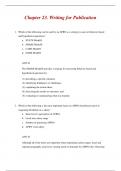
Chapter 23. Writing for Publication
1. Which of the following can be used by an APRN as a strategy to answer behavior-based and hypothetical questions? a. STATE Model® b. SHARE Model® c. CARE Model® d. DARE Model® ANS: B The SHARE Model® provides a strategy for answering behavior-based and hypothetical questions by (1) describing a specific situation, (2) identifying hindrances or challenges, (3) explaining the action taken, (4) discussing the results or outcomes, and (5) evaluating or summarizing what ...
- Package deal
- Exam (elaborations)
- • 9 pages •
1. Which of the following can be used by an APRN as a strategy to answer behavior-based and hypothetical questions? a. STATE Model® b. SHARE Model® c. CARE Model® d. DARE Model® ANS: B The SHARE Model® provides a strategy for answering behavior-based and hypothetical questions by (1) describing a specific situation, (2) identifying hindrances or challenges, (3) explaining the action taken, (4) discussing the results or outcomes, and (5) evaluating or summarizing what ...
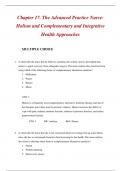
Test Bank for Advanced Practice Nursing Essentials for Role Development 4th Edition Lucille A. Joel {Chapters 16-20}
Chapter 16. The Advanced Practice Nurse and Research Chapter 17. The Advanced Practice Nurse: Holism and Complementary and Integrative Health Approaches Chapter 18. Basic Skills for Teaching and the Advanced Practice Nurse Chapter 19. Culture as a Variable in Practice Chapter 20. Conflict Resolution in Advanced Practice Nursing
- Package deal
- • 5 items •
- Chapter 17. The Advanced Practice Nurse: Holism and Complementary and Integrative Health Approaches • Exam (elaborations)
- Chapter 18. Basic Skills for Teaching and the Advanced Practice Nurse • Exam (elaborations)
- Chapter 16. The Advanced Practice Nurse and Research • Exam (elaborations)
- Chapter 20. Conflict Resolution in Advanced Practice Nursing • Exam (elaborations)
- Chapter 19. Culture as a Variable in Practice • Exam (elaborations)
Chapter 16. The Advanced Practice Nurse and Research Chapter 17. The Advanced Practice Nurse: Holism and Complementary and Integrative Health Approaches Chapter 18. Basic Skills for Teaching and the Advanced Practice Nurse Chapter 19. Culture as a Variable in Practice Chapter 20. Conflict Resolution in Advanced Practice Nursing
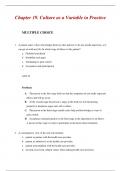
Chapter 19. Culture as a Variable in Practice
MULTIPLE CHOICE 1. A patient states, I have knowledge about my diet and how to do my insulin injections, so I can get on with my life. In which stage of illness is this patient? a. Disbelief and denial b. Irritability and anger c. Attempting to gain control d. Acceptance and participation ANS: D Feedback A. The person in the first stage believes that the symptoms do not really represent illness and will go away. B. At the second stage the person is angry at the body for no...
- Package deal
- Exam (elaborations)
- • 10 pages •
MULTIPLE CHOICE 1. A patient states, I have knowledge about my diet and how to do my insulin injections, so I can get on with my life. In which stage of illness is this patient? a. Disbelief and denial b. Irritability and anger c. Attempting to gain control d. Acceptance and participation ANS: D Feedback A. The person in the first stage believes that the symptoms do not really represent illness and will go away. B. At the second stage the person is angry at the body for no...
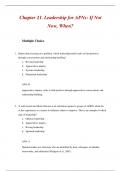
Chapter 21. Leadership for APNs: If Not Now, When?
Multiple Choice 1. Rather than focusing on a problem, which leadership model seeks to find positives through conversations and relationship building? a. Roving leadership b. Appreciative inquiry c. Systems leadership d. Situational leadership ANS: B Appreciative inquiry seeks to find positives through appreciative conversations and relationship building. 2. A well-trusted and liked clinician at an institution speaks to groups of APRNs about his or her experiences as a means...
- Package deal
- Exam (elaborations)
- • 6 pages •
Multiple Choice 1. Rather than focusing on a problem, which leadership model seeks to find positives through conversations and relationship building? a. Roving leadership b. Appreciative inquiry c. Systems leadership d. Situational leadership ANS: B Appreciative inquiry seeks to find positives through appreciative conversations and relationship building. 2. A well-trusted and liked clinician at an institution speaks to groups of APRNs about his or her experiences as a means...
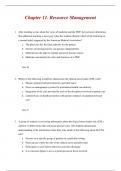
Test Bank for Advanced Practice Nursing Essentials for Role Development 4th Edition Lucille A. Joel {Chapters 11-15}
Chapter 11. Resource Management Chapter 12. Mediated Roles: Working with and Through Other People Chapter 13. Evidence-Based Practice Chapter 14. Advocacy and the Advanced Practice Nurse Chapter 15. Case Management and Advanced Practice Nursing
- Package deal
- • 5 items •
- Chapter 11. Resource Management • Exam (elaborations)
- Chapter 12. Mediated Roles: Working with and Through Other People • Exam (elaborations)
- Chapter 14. Advocacy and the Advanced Practice Nurse • Exam (elaborations)
- Chapter 13. Evidence-Based Practice • Exam (elaborations)
- Chapter 15. Case Management and Advanced Practice Nursing • Exam (elaborations)
Chapter 11. Resource Management Chapter 12. Mediated Roles: Working with and Through Other People Chapter 13. Evidence-Based Practice Chapter 14. Advocacy and the Advanced Practice Nurse Chapter 15. Case Management and Advanced Practice Nursing
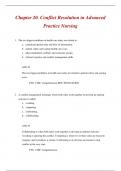
Chapter 20. Conflict Resolution in Advanced Practice Nursing
1. The two biggest problems in health care today are related to: a. centralized patient data and flow of information. b. patient safety and soaring health care costs. c. physician/patient conflicts and consumer groups. d. clinical expertise and conflict management skills. ANS: B The two biggest problems in health care today are related to patient safety and soaring costs. PTS: 1 DIF: Comprehension REF: INNOVATION 2. A conflict management technique where both sides work togeth...
- Package deal
- Exam (elaborations)
- • 9 pages •
1. The two biggest problems in health care today are related to: a. centralized patient data and flow of information. b. patient safety and soaring health care costs. c. physician/patient conflicts and consumer groups. d. clinical expertise and conflict management skills. ANS: B The two biggest problems in health care today are related to patient safety and soaring costs. PTS: 1 DIF: Comprehension REF: INNOVATION 2. A conflict management technique where both sides work togeth...

Chapter 15. Case Management and Advanced Practice Nursing
MULTIPLE CHOICE 1. An APRN is working in an outpatient care clinic for diabetics. He or she is responsible for starting newly diagnosed diabetic patients on long-acting basal insulin to control their fasting morning blood glucose levels. The APRN starts a 55-year-old obese patient 35 units of long- acting insulin nightly. The APRN chooses this dose solely based on the weight of the patient and does not review the patient’s current medication list. The APRN has previously used this method su...
- Package deal
- Exam (elaborations)
- • 13 pages •
MULTIPLE CHOICE 1. An APRN is working in an outpatient care clinic for diabetics. He or she is responsible for starting newly diagnosed diabetic patients on long-acting basal insulin to control their fasting morning blood glucose levels. The APRN starts a 55-year-old obese patient 35 units of long- acting insulin nightly. The APRN chooses this dose solely based on the weight of the patient and does not review the patient’s current medication list. The APRN has previously used this method su...

Chapter 16. The Advanced Practice Nurse and Research
MULTIPLE CHOICE 1. A registered nurse is concerned about the patients perceptions and feelings about the quality of life that they experience after a diagnosis of liver cancer. Which is the most appropriate type of research study the nurse should use to gather information about this situation? a. Quantitative study b. Randomized trial c. Qualitative study d. Case controlled study ANS: C Qualitative research offers analysis of interviews, observations, and/or surveys to measure p...
- Package deal
- Exam (elaborations)
- • 10 pages •
MULTIPLE CHOICE 1. A registered nurse is concerned about the patients perceptions and feelings about the quality of life that they experience after a diagnosis of liver cancer. Which is the most appropriate type of research study the nurse should use to gather information about this situation? a. Quantitative study b. Randomized trial c. Qualitative study d. Case controlled study ANS: C Qualitative research offers analysis of interviews, observations, and/or surveys to measure p...

Chapter 18. Basic Skills for Teaching and the Advanced Practice Nurse
MULTIPLE CHOICE 1. The single most important reason for the decline in the number of hospitalbased diploma programs was a. shift in hospital occupancy from acute care to home care. b. increase in hospital-based medical residency programs competing for educational dollars. c. beginning of associate degree programs that were shorter in length. d. diploma educations position outside the mainstream of higher education. ANS: D Feedback A. The increase in complexity of health care ...
- Package deal
- Exam (elaborations)
- • 6 pages •
MULTIPLE CHOICE 1. The single most important reason for the decline in the number of hospitalbased diploma programs was a. shift in hospital occupancy from acute care to home care. b. increase in hospital-based medical residency programs competing for educational dollars. c. beginning of associate degree programs that were shorter in length. d. diploma educations position outside the mainstream of higher education. ANS: D Feedback A. The increase in complexity of health care ...

TEST BANK PUBLIC HEALTH NURSING: POPULATION-CENTERED HEALTH CARE IN THE COMMUNITY, 10TH EDITION BY STANHOPE
Chapter 28: Care of Patients with Disorders of the Upper Gastrointestinal System |deWit: Medical-Surgical Nursing: Concepts & Practice, 3rd Edition
Chapter 48: Immunostimulants and Immunomodulators Introductory Clinical Pharmacology 12th Edition by Susan M Ford
Chapter 47: Vaccines Introductory Clinical Pharmacology 12th Edition by Susan M Ford
Chapter 43: Male and Female Hormones Introductory Clinical Pharmacology 12th Edition by Susan M Ford